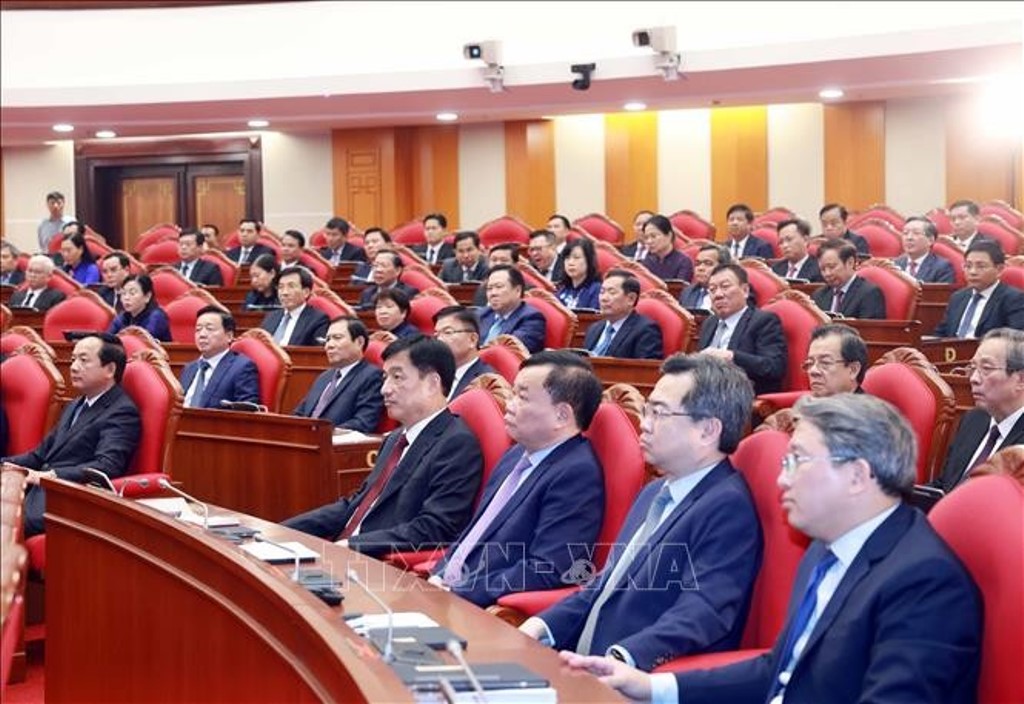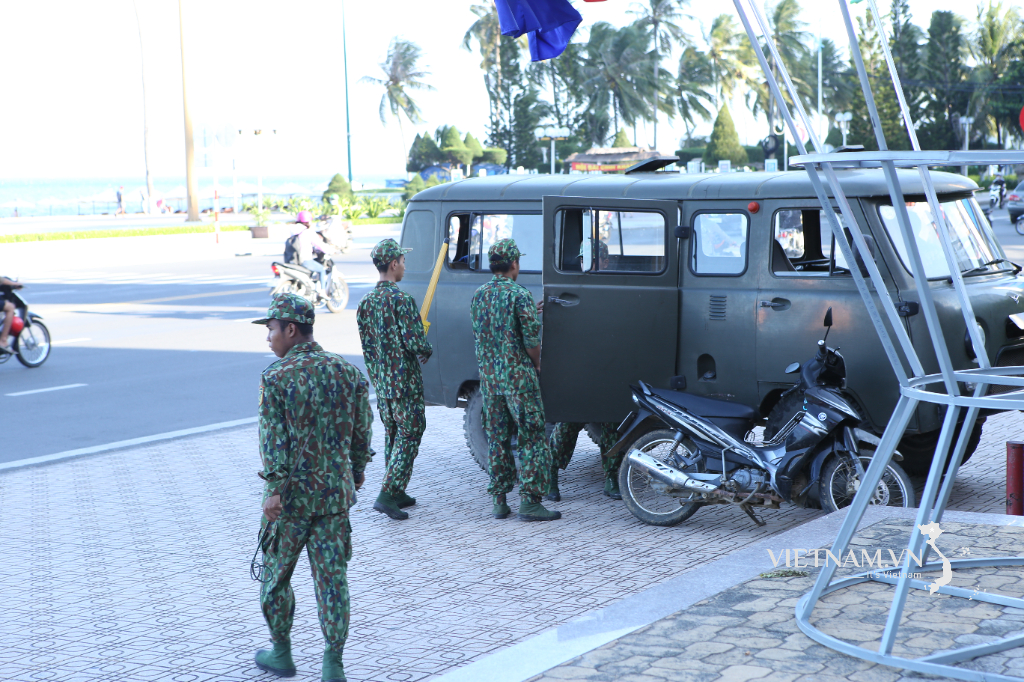The 11th Conference of the 13th Central Committee of the Communist Party of Vietnam unanimously agreed that after the merger, the provincial-level administrative units would consist of 34 provinces and cities (28 provinces and 6 centrally-administered cities), with a two-tiered local government system. The provincial level includes provinces and centrally-administered cities, while the commune level includes communes, wards, and special zones under the jurisdiction of provinces and cities. The operation of district-level administrative units will cease after the National Assembly's resolution to amend and supplement several articles of the 2013 Constitution and the 2025 Law on Organization of Local Government (amended); the number of commune-level administrative units after the merger will be reduced by approximately 60-70%.
At the first meeting of the Steering Committee for the reorganization of administrative units at all levels and the construction of a two-tiered local government model, Minister of Home Affairs Pham Thi Thanh Tra informed that currently, there are 10,035 commune-level administrative units nationwide, and the reorganization will reduce this to approximately 2,000 units. National Assembly Chairman Tran Thanh Man stated that in the latter half of April 2025, the National Assembly Standing Committee will hold continuous meetings to adjust commune-level boundaries.
The process of implementing a revolution in organizational structure to improve efficiency, effectiveness, and productivity for our country's development begins with streamlining the administrative apparatus. This involves not only changes in organizational structure but also in management thinking, awareness, and the quality and efficiency of work. Therefore, it is necessary to intensify propaganda, raise awareness, change thinking for innovation, and simultaneously combat negative manifestations that hinder the streamlining process.
Delegates attending the 11th Central Committee Meeting of the 13th Party Congress
"The merger of administrative units and streamlining of the apparatus involves reducing staff numbers and reorganizing civil servants. This is a sensitive issue, directly affecting the work, morale, and rights of civil servants, and may encounter difficulties in implementation. Therefore, it is necessary to build and perfect mechanisms, have support policies, and adequately address financial, training, career transition, and job placement issues so that civil servants can work with peace of mind. With a new working environment and a larger workload, this workforce must adapt and possess higher capabilities," commented Associate Professor Dr. Ngo Thanh Can (Senior Lecturer, Ho Chi Minh National Academy of Public Administration).
According to Associate Professor Dr. Nguyen Viet Thong (former Secretary General of the Central Theoretical Council), grassroots officials must be truly dynamic, professional, and highly skilled. For a long time, commune officials worked through the district level; now that the district level no longer exists, they are not yet accustomed to the environment of direct transition from the province to the grassroots. Furthermore, the qualifications of commune-level leaders and managers are uneven, especially in mountainous and remote areas. Now, administrative unit management is broader and encompasses more fields, so there is a sense of unfamiliarity; it cannot be accomplished in just a few months. Young people adapt more easily, but older people will find it difficult, so it is necessary to strengthen training for officials and civil servants, especially at the commune level.
Associate Professor Dr. Vu Van Phuc (Vice Chairman of the Scientific Council of the Central Party Agencies, former Editor-in-Chief of the Communist Magazine) noted that when streamlining the apparatus, a large number of leading officials, managers, and civil servants will have to leave the system. Therefore, a portion of leading officials, managers, and civil servants from the central to the grassroots levels must understand that "in this organizational revolution, sacrifices must be accepted." In addition, mechanisms and policies are needed to retain capable individuals with good political qualities, strong character, good ethics and lifestyle, and high competence, who can meet the demanding requirements of the reorganization.
Because after streamlining, the responsibilities of leaders, managers, and each civil servant position are much higher, with more work, a wider scope, and higher quality requirements to ensure smooth, efficient, effective, and successful operations, as General Secretary To Lam stated. In particular, there should be appropriate policies for those who wish to retire early, those who leave their jobs, or those who transfer to new fields or jobs.
It is necessary to reassess and reclassify the civil servant workforce of the entire provincial and commune-level administrative system. Those who are capable should be retained and assigned to positions within the new system; those who are unsuitable should have their benefits and policies addressed according to regulations. In the long term, the Law on Civil Servants needs to be amended to provide a legal basis for building a new civil service system based on job positions, eliminating the distinction between commune-level and provincial-level civil servants; replacing the "lifetime employment" system with a contract system for civil servants based on job positions; and abolishing the regulation that one place recruits for one place to employ, replacing it with the principle of "whoever employs, recruits," and being responsible for their own decisions.
Regarding streamlining, if something is "compact" but not "refined," it cannot be "strong." And without "strength," it is difficult to achieve the goals of "efficiency, effectiveness, and efficiency." Therefore, it is necessary to select individuals with sufficient competence, qualifications, dedication, and high responsibility to be placed in the new system. At the same time, it is necessary to courageously address policies and regulations for those who do not meet job requirements or do not wish to continue working in public service.
ARN
Source: https://baoangiang.com.vn/giai-bai-toan-ve-nhan-su-khi-sap-nhap-a419628.html




![[Photo] General Secretary To Lam visits the exhibition space showcasing books, photo exhibitions, and achievements of digital transformation in journalism.](/_next/image?url=https%3A%2F%2Fvphoto.vietnam.vn%2Fthumb%2F1200x675%2Fvietnam%2Fresource%2FIMAGE%2F2025%2F12%2F19%2F1766110879215_1766110240024-jpg.webp&w=3840&q=75)



![[Photo] Enchanting ancient rose garden on the mountainside in Nghe An](/_next/image?url=https%3A%2F%2Fvphoto.vietnam.vn%2Fthumb%2F1200x675%2Fvietnam%2Fresource%2FIMAGE%2F2025%2F12%2F19%2F1766109900916_vuon-hong-chin-do-thu-hut-du-khach-toi-check-in-o-ha-noi-3-20162778-1671624890024-1671624890104198100259.jpeg&w=3840&q=75)











































![[INFOGRAPHIC] Overview of the Hoa Phat Dung Quat Rail and Special Steel Production Plant Project](https://vphoto.vietnam.vn/thumb/402x226/vietnam/resource/IMAGE/2025/12/19/1766111183203_z7339170069817-126a3e5a095f62e606a0be41015c1b80.jpeg)














































Comment (0)